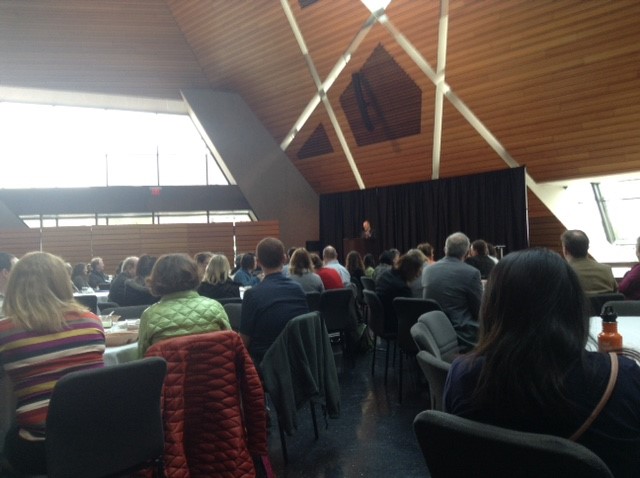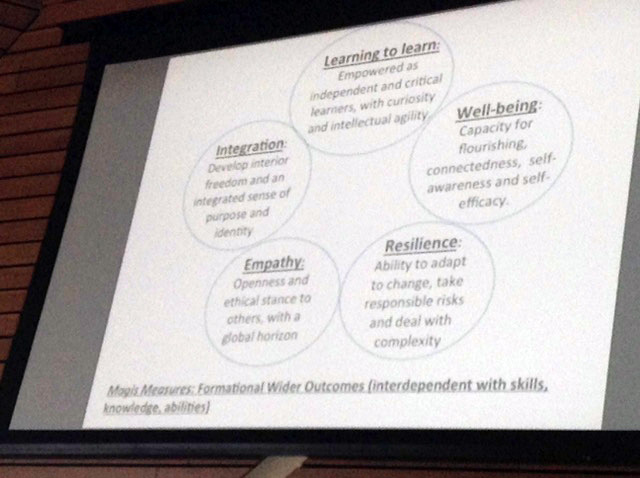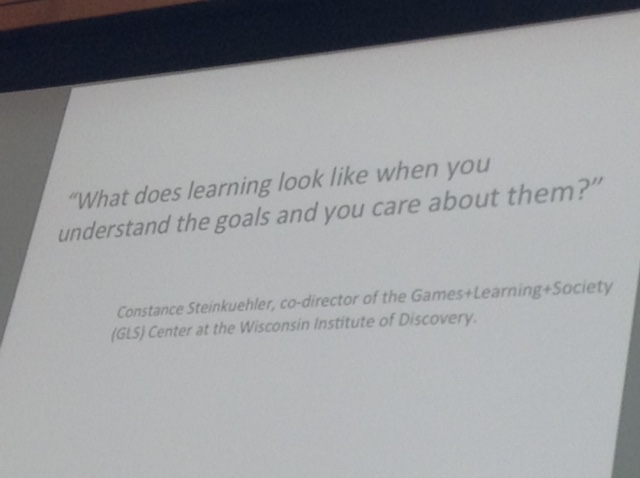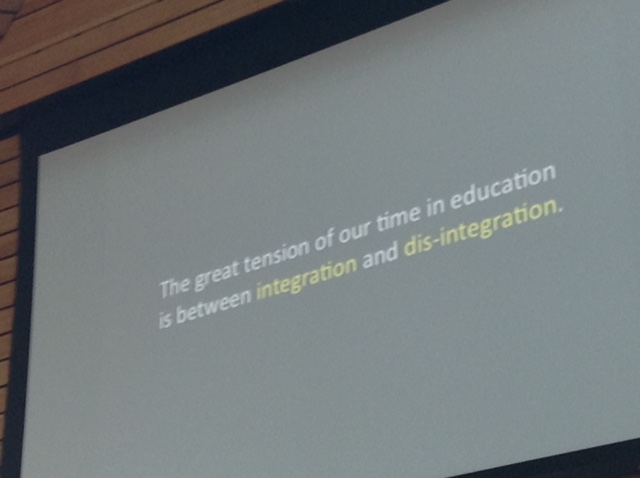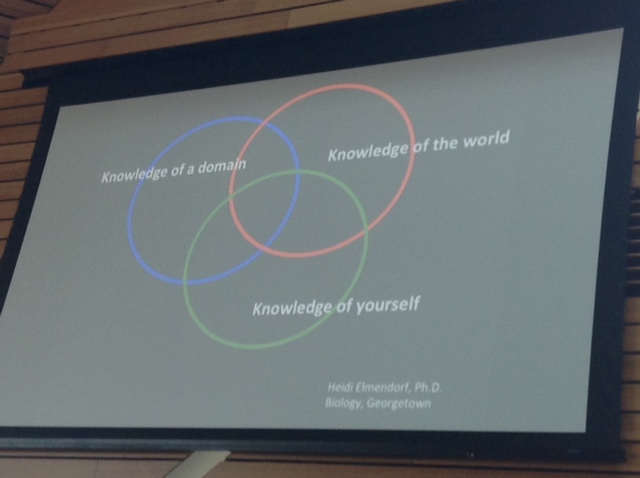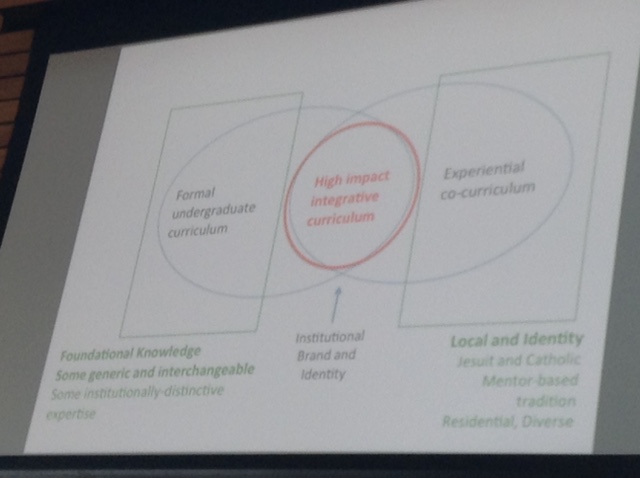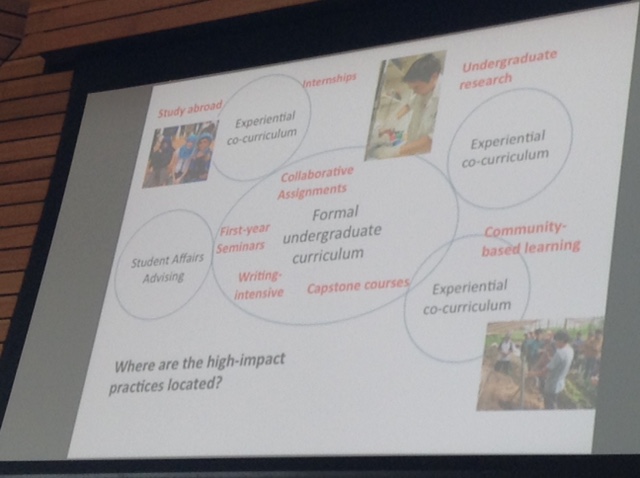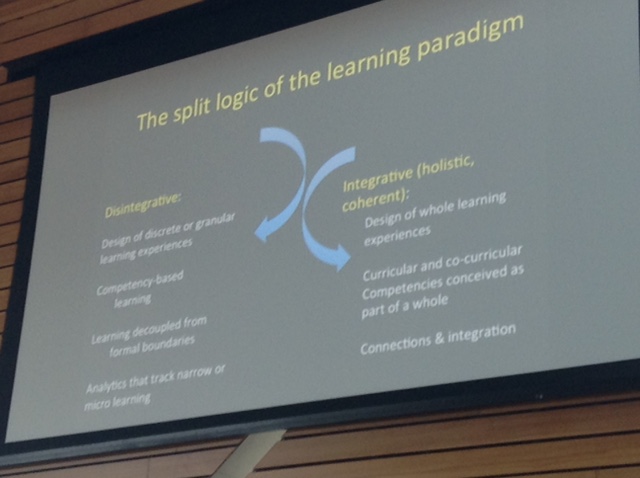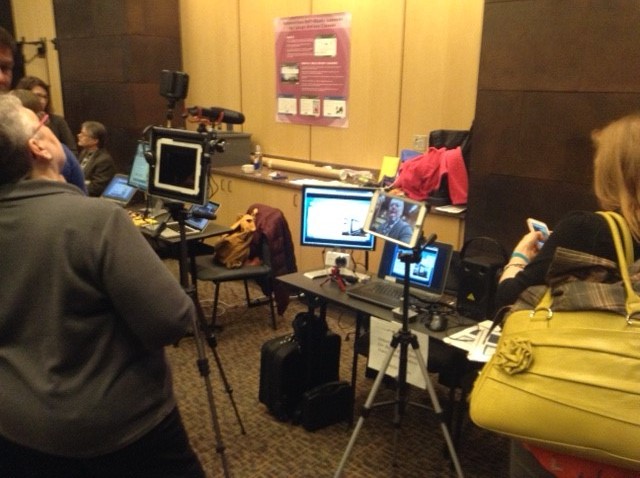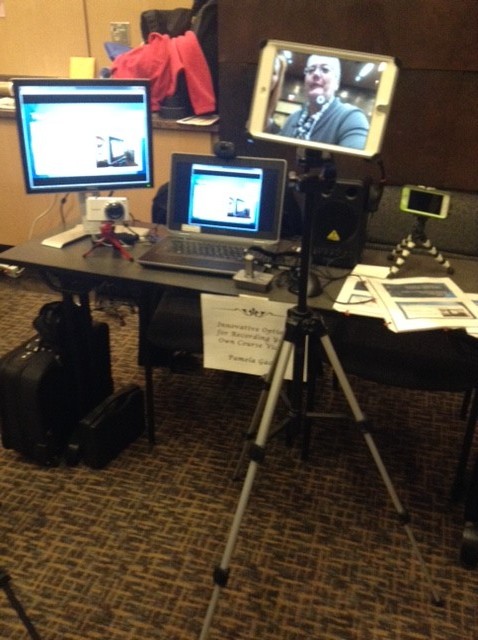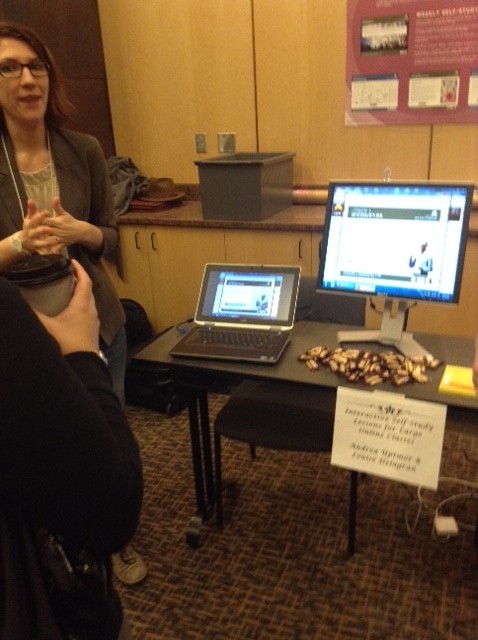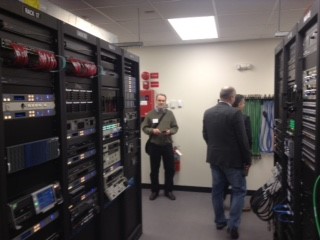Join us next Tuesday, November 10th from 12:00 PM to 1:00 PM, for a special SIG Series webinar: Tales from the National Forum on Active Learning Classrooms
The WSU Learning Spaces Team attended the National Forum on Active Learning Classrooms at the University of Minnesota – Twin Cities this summer and learned a lot. With topics ranging from picking whiteboards to better integrating classroom design into your campus strategic planning efforts, the conference was a treasure trove of good practices, pictures of cool new classrooms, links to useful information, and pro tips. Join us as we share what we learned at this amazing gathering. If you didn’t get a chance to go, this session will be a great opportunity to zoom in on the highlights. If you went, we would love to compare notes!
Ken Graetz, Tom Hill, Stephanie Stango, Dave Burman, and Eric Wright are all part of the Winona State University Learning Spaces Team and members of the Teaching, Learning, and Technology Services unit of Information Technology Services. They attended the National Forum as a team this summer and were able to cover almost all of the sessions. Each brings a unique perspective to the discussion, from under-the-hood classroom systems design and configuration to instructional design and pedagogical strategies.
Register for the webinar at http://www.eventbrite.com/o/minnesota-online-quality-initiative-7290950883. Please forward this on to anyone on your campus who might be interested.
Link to the Virtual Room:
https://moqi.zoom.us/j/672493176
Or join by phone:
+1 646 568 7788 (US Toll) or +1 415 762 9988 (US Toll)
Meeting ID: 672 493 176
FlexSpace. flexspace.org
CCUMC Leadership in Media and Academic Technology. http://www.ccumc.org
EduCause learning space rating system.
http://www.educause.edu/eli/initiatives/learning-space-rating-system
McGill Principles for Designing of Teaching and Learning Spaces has rubric
most useful technology in an ALC appears to be the whiteboard.
Whiteboards are also very glitchy. Projecting my tablet or laptop is just as effective–with less glitches
evidence that students are reluctant to engage in active learning.
the U has done work, but the “Canadians have the process”
the support faculty gets from technicians: two week in the beginning of the semester in a new classroom.
what is the most important goal of your college education and therefore of this course: a. inquiring information b. learning how to sue information and knowledge in anew situation c. developing skills to continue learning after college
- creativity
- computer skills
- GPA cutoff above 3.0
- problem solving skills
- teamwork skills
- verbal communication
- written communication skills
GigaPan.com instructor will have students use in classes to identify problems engaging in a virtual field trip. student engagement
design thinking
wikispaces as GOogle docs, MS Word 16, work collaboratively
not group, but team. team work very important
take what we learned in ALCs to traditional large lecture halls
blending the formal with the informal (including outdoors)
connecting ALCs together across distance
thinking about gear (raised floors, smart kapp boards) http://smartkapp.com/
LITA and The EDUCAUSE Blended and Online Learning Constituent Group have a discussion regarding e-conferencing tools (online meeting tools) and browser problems related to them:
BlackBoard Collaborate: https://youtu.be/UWX2kRazC-s has difficulties working on Google Chrome and Windows 10 Edge browser, since they not support Java.
WebEx, Canva. Adobe Connect, Zoom, Ultra
From: lita-l-request@lists.ala.org [mailto:lita-l-request@lists.ala.org] On Behalf Of Tyckoson, Mary Ellen
Sent: Friday, October 02, 2015 9:51 AM
To: lita-l@lists.ala.org
Subject: RE: [lita-l] Free teleconferencing options?
We’ve been using https://www.freeconferencecall.com/ for years. It offers a record feature that allows you to download the call later as well as a report of the numbers that called in and the duration of their connection to the conference. Generally the call clarity is pretty good. The only time we had a problem seemed to be on the end user’s side. I think they also offer some free online meeting services, but we’ve never used those. The down side if that they are able to offer it for free because they are toll calls (usually to some number in a sparsely populated area – at least one of the numbers we use is out in the Mojave desert.)
Regards,
Mary Ellen
*~*~*~*~*~*~*~*~*~*~*~*
Mary Ellen Tyckoson
Library Program Manager
San Joaquin Valley Library System
2420 Mariposa St, Fresno, CA 93721
559-600-6285
From: The EDUCAUSE Blended and Online Learning Constituent Group Listserv [mailto:BLEND-ONLINE@LISTSERV.EDUCAUSE.EDU] On Behalf Of J. Patrick Whitaker
Sent: Wednesday, September 30, 2015 2:09 PM
To: BLEND-ONLINE@LISTSERV.EDUCAUSE.EDU
Subject: Re: [BLEND-ONLINE] Online meeting tools
We have Ultra available – albeit in a “not quite ready for prime time” format (i.e. no recording, polling, etc.). We can assign it by course so some faculty are using Ultra for office hours. It’s much easier for students in particular.
- Patrick Whitaker, PhD
Associate Professor, Assistant Coordinator,
Center for Distance Learning
- Sargeant Reynolds Community College
PO BOX 85622
Richmond, Virginia 23285-5622
804-523-5612
“Education is what people do to you; Learning is what you do to yourself” – Joi Ito
From: The EDUCAUSE Bended and Online Learning Constituent Group Listserv [mailto:BLEND-ONLINE@LISTSERV.EDUCAUSE.EDU] On Behalf Of Doug Kahn
Sent: Wednesday, September 30, 2015 3:06 PM
To: BLEND-ONLINE@LISTSERV.EDUCAUSE.EDU
Subject: Re: [BLEND-ONLINE] Online meeting tools
We were told the release will come mid-semester and because we are in a system-wide environment shared by over 50 campuses, we will go at that time. I would much prefer to do it in January.
From: Scott Robison <sarobison@MAIL.PLYMOUTH.EDU>
Reply-To: EDUCAUSE Listserv <BLEND-ONLINE@LISTSERV.EDUCAUSE.EDU>
Date: Wednesday, September 30, 2015 at 3:01 PM
To: EDUCAUSE Listserv <BLEND-ONLINE@LISTSERV.EDUCAUSE.EDU>
Subject: Re: [BLEND-ONLINE] Online meeting tools
I have seen Collaborate Ultra (briefly) and agree it is completely different (in a good way). Last spring I was told by our account exec that it would be available to us beginning of fall. Haven’t heard anything yet and I’m not holding my breath… 😉
Scott Scott Robison, Ph.D.
Director, Learning Technologies and Online Education
Co-Director, Center for Excellence in Teaching and Learning
Plymouth State University
Plymouth, NH
603.535.2262
“All courses are online courses; it’s just a matter of
how much time you meet face-to-face.”
From: The EDUCAUSE Blended and Online Learning Constituent Group Listserv [mailto:BLEND-ONLINE@LISTSERV.EDUCAUSE.EDU] On Behalf Of Covello, Steve
Sent: Wednesday, September 30, 2015 2:42 PM
To: BLEND-ONLINE@LISTSERV.EDUCAUSE.EDU
Subject: Re: [BLEND-ONLINE] Online meeting tools
One thing to consider with Bb Collaborate is that, since it is Java driven, there may be problems for users whose browsers no long support Java (Chrome, for one, and I think Windows 10 Edge browser too?).
https://java.com/en/download/faq/chrome.xml
“Java applications are offered though web browsers as either a web start application (which do not interact with the browser once they are launched) or as a Java applet (which might interact with the browser). This change does not affect Web Start applications, it only impacts applets.”
This is not a deal breaker because BbC doesn’t run in a browser (it just downloads the starter app). But the subsequent error message could throw some participants off.
There is a an HTML5 version in the works, I hear (haven’t seen it yet). But keep the Java aspect in mind, as it appears to me at least (FWIW) that Java is the new Flash — moving towards disfavor due to potential security issues.
Thx – Steve — Steve Covello
Rich Media Specialist/Instructional Designer/Online Instructor
Chalk & Wire e-Portfolio Administrator
Granite State College
603-513-1346
Skype: steve.granitestate
Scheduling: http://meetme.so/stevecovello
From: The EDUCAUSE Blended and Online Learning Constituent Group Listserv <BLEND-ONLINE@LISTSERV.EDUCAUSE.EDU> on behalf of Doug Kahn <kahnd@SUNYSUFFOLK.EDU>
Reply-To: The EDUCAUSE Blended and Online Learning Constituent Group Listserv <BLEND-ONLINE@LISTSERV.EDUCAUSE.EDU>
Date: Wednesday, September 30, 2015 2:29 PM
To: The EDUCAUSE Blended and Online Learning Constituent Group Listserv <BLEND-ONLINE@LISTSERV.EDUCAUSE.EDU>
Subject: Re: [BLEND-ONLINE] Online meeting tools
At SCCC we have gone with Collaborate – largely due to integration to Blackboard Learn and the excellent pricing the SUNY system received. The interface isn’t the most intuitive for presenters, but works well enough. We recently saw Collaborate Ultra which will be launched this fall. The interface was ‘zoomed’ for lack of a better term. It is a huge improvement, extremely intuitive and performs significantly better. That with the Blackboard Learn integration makes any thought of looking elsewhere a non-starter for us.
Regards, Doug —— Doug Kahn
College Assistant Dean for Instructional Technology
Huntington Library – L10
Suffolk County Community College
533 College Road
Selden, NY 11784
631-451-4575
kahnd@sunysuffolk.edu
From: <Liu>, Christie – liujc <liujc@JMU.EDU>
Reply-To: EDUCAUSE Listserv <BLEND-ONLINE@LISTSERV.EDUCAUSE.EDU>
Date: Wednesday, September 30, 2015 at 2:08 PM
To: EDUCAUSE Listserv <BLEND-ONLINE@LISTSERV.EDUCAUSE.EDU>
Subject: Re: [BLEND-ONLINE] Online meeting tools
Hello,
We are providing a sandbox type of immersive program for faculty here to explore features of different web conferencing tools. Any information about integration of Training Center in WebEx to Canvas will be greatly appreciated.
Christie
========================
Juhong Christie Liu, Ph.D.
Senior Instructional Designer
Center for Instructional Technology
James Madison University
540.568.2381
********************************************************
“We become ourselves through others.” —Vygotsky
From: The EDUCAUSE Blended and Online Learning Constituent Group Listserv <BLEND-ONLINE@LISTSERV.EDUCAUSE.EDU> on behalf of “Akter, Nafiza” <nafiza@NJIT.EDU>
Reply-To: The EDUCAUSE Blended and Online Learning Constituent Group Listserv <BLEND-ONLINE@LISTSERV.EDUCAUSE.EDU>
Date: Tuesday, August 18, 2015 at 8:59 AM
To: “BLEND-ONLINE@LISTSERV.EDUCAUSE.EDU” <BLEND-ONLINE@LISTSERV.EDUCAUSE.EDU>
Subject: Re: [BLEND-ONLINE] Online meeting tools
Currently, NJIT uses WebEx and I used Adobe Connect at a different institution; we have WebEx set up so that instructors can create their own sessions as they find the need. They are both robust but have their own quirks to them. Adobe Connect had a big learning curve for instructors. WebEx seems a bit simpler just to start but I feel like it has more audio issues when you do VOIP; it’s also very confusing for our users because you have to click on a button after you log into WebEx to turn audio on. That goes for everyone–presenter and participant, no one can hear or be heard until this is done. Even users that have done this for a while sometimes forget this part–I’d say that’s the biggest quirk about it.
I have seen a lot of use of Zoom recently, but I don’t know if it is quite as robust or permits you to do as long or large of a session as WebEx would.
On Mon, Aug 17, 2015 at 3:41 PM, Barbara Anderson <banderson17@roosevelt.edu> wrote:
Our university is trying to determine which would be the best online meeting/class tool. We have narrowed our search down to Webex and Zoom. I was wondering if anyone, who is currently using these two tools, could give me some pros and cons for their use.
Thanks,
Barbara Anderson Ed.D.
Sr. Academic Technology Specialist
Roosevelt University
430 S. Michigan Ave, Room 380
Chicago, IL 60605
312-341-2061
Join.me is another great, free option, which also can be used for web conferencing in case you need to share a presentation.
See: https://www.join.me, https://www.join.me/solutions/free-conference-call.
Thanks,
Darlene Davis
Digital Asset Coordinator
Alliance Life Sciences Consulting Group
From: The EDUCAUSE Blended and Online Learning Constituent Group Listserv [mailto:BLEND-ONLINE@LISTSERV.EDUCAUSE.EDU] On Behalf Of Rob Abel
Sent: Thursday, October 15, 2015 7:23 PM
To: BLEND-ONLINE@LISTSERV.EDUCAUSE.EDU
Subject: Re: [BLEND-ONLINE] Online meeting tools
Ed, et al-
We recently learned about an LTI integration for Connect from eSyncTraining. It is not yet certified LTI – but quite slick – and eSyncTraining recently joined IMS to get it certified.
https://www.esynctraining.com
From: The EDUCAUSE Blended and Online Learning Constituent Group Listserv [mailto:BLEND-ONLINE@LISTSERV.EDUCAUSE.EDU] On Behalf Of Ed Garay
Sent: Thursday, October 15, 2015 7:12 PM
To: BLEND-ONLINE@LISTSERV.EDUCAUSE.EDU
Subject: Re: [BLEND-ONLINE] Online meeting tools
The feedback has been mixed. Some faculty like it, others hate it. Personally, I am disappointed that the java-less version is still elusive, that the LMS integration, albeit certified LTI, is not smart enough for my demanding taste, and that UIC was never able to really effectively and easily use it for non-Teaching & Learning applications. Elluminate Live! and Blackboard Inc. both knew we needed it also as a GoToMeeting-kind of solution, and they never delivered on that. (We had run Saba Centra Web Conferencing for many years before most of these tools ever existed)
My personal recommendation, today, would be to seriously evaluate Adobe Connect (again) and Zoom, …as long as they have an IMS Global-certified LTI integration.
—
— Ed Garay
University of Illinois at Chicago
UIC School of Public Health
http://www.twitter.com/garay
Academic Technologies Twitter stream by a curated list of 1,200+ HigherEd IT, e-Learning & EdTech colleagues and selected vendors: http://twitter.com/garay/academic-technologies
From: Scott Robison
Sent: 10/15/2015 3:35 PM
To: Edward Garay
Subject: RE: [BLEND-ONLINE] Online meeting tools
Ed,
How has the feedback been with Collaborate? We started using it a couple years ago too. There was more excitement for it then than there is now. There have been browser and Java issues and some find it too clunky, quality lacking (audio/video), and for many it is more than they need (or think they need). We are working on getting Collaborate Ultra integrated into Moodle. It is pretty sharp (web-based, clean, but fewer features at the moment). Are you using that, and if so, what do folks think?
Thanks, Scott Scott Robison, Ph.D.
Director, Learning Technologies and Online Education
Co-Director, Center for Excellence in Teaching and Learning
Plymouth State University
Plymouth, NH
603.535.2262
“All courses are online courses; it’s just a matter of
how much time you meet face-to-face.”
From: The EDUCAUSE Blended and Online Learning Constituent Group Listserv [mailto:BLEND-ONLINE@LISTSERV.EDUCAUSE.EDU] On Behalf Of Edward Garay
Sent: Thursday, October 15, 2015 4:03 PM
To: BLEND-ONLINE@LISTSERV.EDUCAUSE.EDU
Subject: Re: [BLEND-ONLINE] Online meeting tools
I always liked Adobe Connect and thought it was easy to use by faculty, staff and students. We almost got it, a few years ago, but the committee picked up Blackboard Collaborate because it was more Teaching & Learning-friendly, which it was/is.
It would have helped if Adobe had invested in developing an LTI-compliant LMS integration for Connect. They still haven’t, unfortunately, certified or otherwise, I am afraid.
—
— Ed Garay
University of Illinois at Chicago
UIC School of Public Health
http://www.twitter.com/garay
Academic Technologies Twitter stream by a curated list of 1,200+ HigherEd IT, e-Learning & EdTech colleagues and selected vendors: http://twitter.com/garay/academic-technologies
On Thu, Oct 15, 2015 at 11:25 AM -0700, “Snyder, Matthew” <matthew.snyder@yale.edu> wrote:
Our primary online meeting tool is Adobe Connect, but we have been using Zoom for a year as well. The feedback we receive is that Adobe Connect is very “feature rich” and somewhat difficult to use at times, especially for individuals who simply want an easy web collaboration tool. Although some have become very comfortable with Adobe Connect and utilize many of the features and pods, it may be a bit complicated and confusing to use at times.
We have been using Zoom and although it does not have as many of the features as Adobe Connect, the quality is great and it’s easy to use. Zoom offers basic and pro accounts, as well as different meeting room options, SIP, VoIP, etc..
Best,
Matthew Snyder
Collaboration Technology Specialist
Yale Center For Teaching and Learning
w: 203.436.8427
m: 203.687.5819
http://ctl.yale.edu
http://zoom.us/my/matthewsnyder
http://greet.yale.edu/msmtg
From: “Curbeam, Dionne” <DCurbeam@COPPIN.EDU>
Reply-To: The EDUCAUSE Blended and Online Learning Constituent Group Listserv <BLEND-ONLINE@LISTSERV.EDUCAUSE.EDU>
Date: Thu, 1 Oct 2015 18:35:47 +0000
To: <BLEND-ONLINE@LISTSERV.EDUCAUSE.EDU>
Subject: Re: [BLEND-ONLINE] Online meeting tools
Hello. I am curious how many are using Microsoft Lync online meeting/class tool. If so, what has been your experience?
Thanks!Dionne N. Curbeam, Director
Instructional Technology & Training
Coppin State University
From: The EDUCAUSE Blended and Online Learning Constituent Group Listserv [mailto:BLEND-ONLINE@LISTSERV.EDUCAUSE.EDU] On Behalf Of Liu, Christie – liujc
Sent: Wednesday, September 30, 2015 2:08 PM
To: BLEND-ONLINE@LISTSERV.EDUCAUSE.EDU
Subject: Re: [BLEND-ONLINE] Online meeting tools
Hello,
We are providing a sandbox type of immersive program for faculty here to explore features of different web conferencing tools. Any information about integration of Training Center in
From: The EDUCAUSE Blended and Online Learning Constituent Group Listserv [mailto:BLEND-ONLINE@LISTSERV.EDUCAUSE.EDU] On Behalf Of Ed Garay
Sent: Wednesday, September 30, 2015 2:55 PM
To: BLEND-ONLINE@LISTSERV.EDUCAUSE.EDU
Subject: Re: [BLEND-ONLINE] Online meeting tools
Please note that there are IMS-certified LTI tools and other “rogue” LTI tools that are not certified. The certified LTI tools go through a rigorous IMS process to ensure they are fully LTI-compliant. We should strive to use certified LTI LMS add-one, exclusively, and require/demand that vendors and individual developers of tools not certified be reprogram to meet full IMS LTI certification.
The IMS Certified LTI Tools catalog currently lists only Blackboard Collaborate and BigBlueButton, i.e. not Zoom, Adobe Connect, WebEX, GoToMeeting, etc. – http://developers.imsglobal.org/catalog.html
The Edu App Center, maintained by Instructure, purports to list certified and uncertified LTI tools. Adobe Connect (for Canvas, I believe) is listed (sans the LMS certification); I cannot find any listing of Zoom, however. – https://www.eduappcenter.com/
I am CCing Rob Abel, CEO at IMS Global, in case he’d like to chime in on the LTI certification or lack thereof.
— Ed Garay
University of Illinois at Chicago
UIC School of Public Health
twitter.com/garay
“We become ourselves through others.” —Vygotsky
From: The EDUCAUSE Blended and Online Learning Constituent Group Listserv <BLEND-ONLINE@LISTSERV.EDUCAUSE.EDU> on behalf of “Akter, Nafiza” <nafiza@NJIT.EDU>
Reply-To: The EDUCAUSE Blended and Online Learning Constituent Group Listserv <BLEND-ONLINE@LISTSERV.EDUCAUSE.EDU>
Date: Tuesday, August 18, 2015 at 8:59 AM
To: “BLEND-ONLINE@LISTSERV.EDUCAUSE.EDU” <BLEND-ONLINE@LISTSERV.EDUCAUSE.EDU>
Subject: Re: [BLEND-ONLINE] Online meeting tools
Currently, NJIT uses WebEx and I used Adobe Connect at a different institution; we have WebEx set up so that instructors can create their own sessions as they find the need. They are both robust but have their own quirks to them. Adobe Connect had a big learning curve for instructors. WebEx seems a bit simpler just to start but I feel like it has more audio issues when you do VOIP; it’s also very confusing for our users because you have to click on a button after you log into WebEx to turn audio on. That goes for everyone–presenter and participant, no one can hear or be heard until this is done. Even users that have done this for a while sometimes forget this part–I’d say that’s the biggest quirk about it.
I have seen a lot of use of Zoom recently, but I don’t know if it is quite as robust or permits you to do as long or large of a session as WebEx would.
On Mon, Aug 17, 2015 at 3:41 PM, Barbara Anderson <banderson17@roosevelt.edu> wrote:
Our university is trying to determine which would be the best online meeting/class tool. We have narrowed our search down to Webex and Zoom. I was wondering if anyone, who is currently using these two tools, could give me some pros and cons for their use.
Thanks,
Barbara Anderson Ed.D.
Sr. Academic Technology Specialist
Roosevelt University
430 S. Michigan Ave, Room 380
Chicago, IL 60605
312-341-2061
********** Participation and subscription information for this EDUCAUSE Constituent Group discussion list can be found at http://www.educause.edu/groups/.
—
Nafiza Akter
Instructional Designer
Instructional Technology & Media Services (ITMS)
New Jersey Institute of Technology
e-mail: nafiza@njit.edu
phone: 973-596-7050
Midwest AV Summit

Matthew Clay : Active Learning Spaces
partners across campus for IT/AV: CETL
What is the most important key for creating active learning spaces (ALS).
Mathew shared his work with CETL and his understanding of the importance of faculty being brought to the table. Faculty as equal stakeholder in the process.
In a conversation with him after the presentation, he agreed that faculty must be the leading force in in generating ideas what new technology and how to implement technology in the classroom. He agreed that at the present IT/AV staff is the leading force and this is a corrupt statuquo
key partnerships:
faculty and academic affairs, students, facilities, architects, engineers, contractors, furniture vendors, IT (networking, support instructional design)
challanges: ITS mindset (conservative), Administration must be on board (money), Funding.
MnSCU is not Google friendly. 60% of the staff is not doing the same tasks as 3 years ago.
Open about challenges, sharing more with faculty. Nice to hear this, but the communication must be much larger, to the point when faculty are equal partners in a relationship, which is not far from equal decision making.
If faculty is not considered a REAL stakeholder (versus intimated body in a meeting which is controlled by IT people), the entire technology use goes down the drain. Faculty is much stronger relationship with students then IT is with students. The presentation put weight on IT staff and its connection with students’ needs. It is questionable how IT staff can make stronger connection then faculty, who are in a daily contact with students.
The issue is how to assist faculty to catch up with the technology, not how IT staff to rival faculty in their connection with students. What faculty lacks in understanding of technology cannot be replaced by IT staff increasing interaction with students, but rather assisting faculty with coming to terms with technology.
maintaining innovation: fail fast and fail forward; keep up to date with technology (blank statement); always look for new furniture; focus on space design instead of just A/V; Challenge yourself with new ideas; always learn from your mistakes; always get feedback from students and faculty (again, the PERIPHERAL role of faculty. Is feedback all expected from faculty? It faculty and IT staff must be equal partners at the decision table. not faculty being consulted at decision made by IT staff)
Google Glass mentioned, Pebble watches. supposedly to understand students habits. Big data used to profiling students is very fashionable, but is it the egg in the basket?
they have 3d printer, Inoculus. Makerspace mentioned
examples how to use 3d printing for education (LRS archive collections, MN digital library).
the presenter kept asking if there are questions. it makes me wonder how far back (pedagogically or androgogically) IT staff must be to NOT consider backchanneling. Social media is not a novelty and harvesting opinions and questions using social media should not be neglected

digital classroom breakdown session
Break down session: Digital Classroom
technical, very IT. I am not versed enough to draw impression on how it projects over real faculty work. HDMI cables.
relating to the previous presentation: I really appreciate the IT / AV staff handling all this information, which is complex and important; but during my 15 years tenure at SCSU I learned to be suspicious of when the complexity and the importance of the techy matter starts asserting itself as leading when the pedagogy in the classroom is determined.
HD flow and other hardware and software solutions
VLAN 3. lecture capture.
BYOD support in the classroom: about half of the room raised their hands.
http://cdn.nmc.org/media/2014-nmc-horizon-report-library-EN.pdf
p. 4 new and rapidly changing technologies, an abundance of digital information in myriad formats, an increased understanding of how students learn evolving research methods, and changing practices in how scholars communicate and disseminate their research and creative work.
Engagement requires an outward focus
A liaison who understands how scholars in a particular discipline communicate and share
information with one another can inform the design and development of new publishing services, such as
digital institutional repositories.
Liaisons cannot be experts themselves in each new capability, but knowing when to call in a
colleague, or how to describe appropriate expert capabilities to faculty, will be key to the new liaison role.
an increasing focus on what users do (research, teaching, and learning) rather than on what librarians do (collections, reference, library instruction).
hybrid model, where liaisons pair their expertise with that of functional specialists, both within and outside of libraries
p. 6 Trend 1: Develop user-centered library services
Many libraries are challenged to brand such a service point, citing a “hub” or “center” to refer to services that can include circulation, reference, computer support, writing assistance, and more.
For liaisons, time at a reference desk has been replaced by anticipating recurrent needs and developing
easily accessible online materials (e.g., LibGuides, screencasts) available to anyone at any time, and
by providing more advanced one-on-one consultations with students, instructors, and researchers who
need expert help. Liaisons not only answer questions using library resources, but they also advise and
collaborate on issues of copyright, scholarly communication, data management, knowledge management,
and information literacy. The base level of knowledge that a liaison must possess is much broader than
familiarity with a reference collection or facility with online searching; instead, they must constantly keep up
with evolving pedagogies and research methods, rapidly developing tools, technologies, and ever-changing
policies that facilitate and inform teaching, learning, and research in their assigned disciplines.
Librarians at many institutions are now focusing on collaborating with faculty to develop thoughtful assignments
and provide online instructional materials that are built into key courses within a curriculum and provide
scaffolding to help students develop library research skills over the course of their academic careers
p. 7 Trend 2: A hybrid model of liaison and functional specialist is emerging.
Current specialist areas of expertise include copyright, geographic information systems (GIS), media production and integration, distributed education or e-learning, data management, emerging technologies,
user experience, instructional design, and bioinformatics.
At the University of Guelph, the liaison model was abandoned altogether in favor of a functional specialist
approach
p. 8 Trend 3: Organizational flexibility must meet changing user needs.
p. 9 provide education and consultation services for personal information management. Tools, workshops, websites, and individual consults are offered in areas such as citation management, productivity tools, managing alerts and feeds, personal archiving, and using social networking for teaching and professional development.
p. 11 data management, knowledge management and scholarly communication
digital scholarship
p. 12 Liaisons need to be able to provide a general level of knowledge about copyright, data management, the need for metadata and the ontologies available in their disciplines.
p. 13 Liaisons need to be able to provide a general level of knowledge about copyright, data management, the need for metadata and the ontologies available in their disciplines.
p. 16 replacing the traditional tripartite model of collections, reference, and instruction
